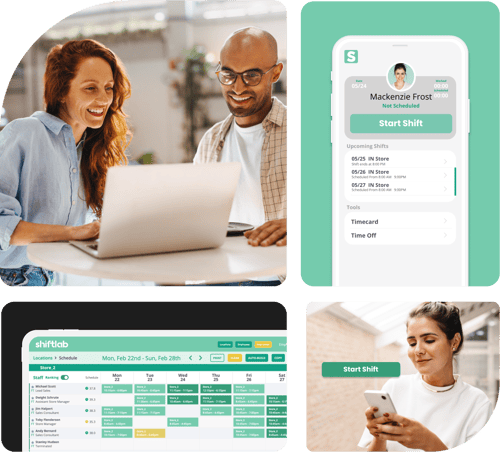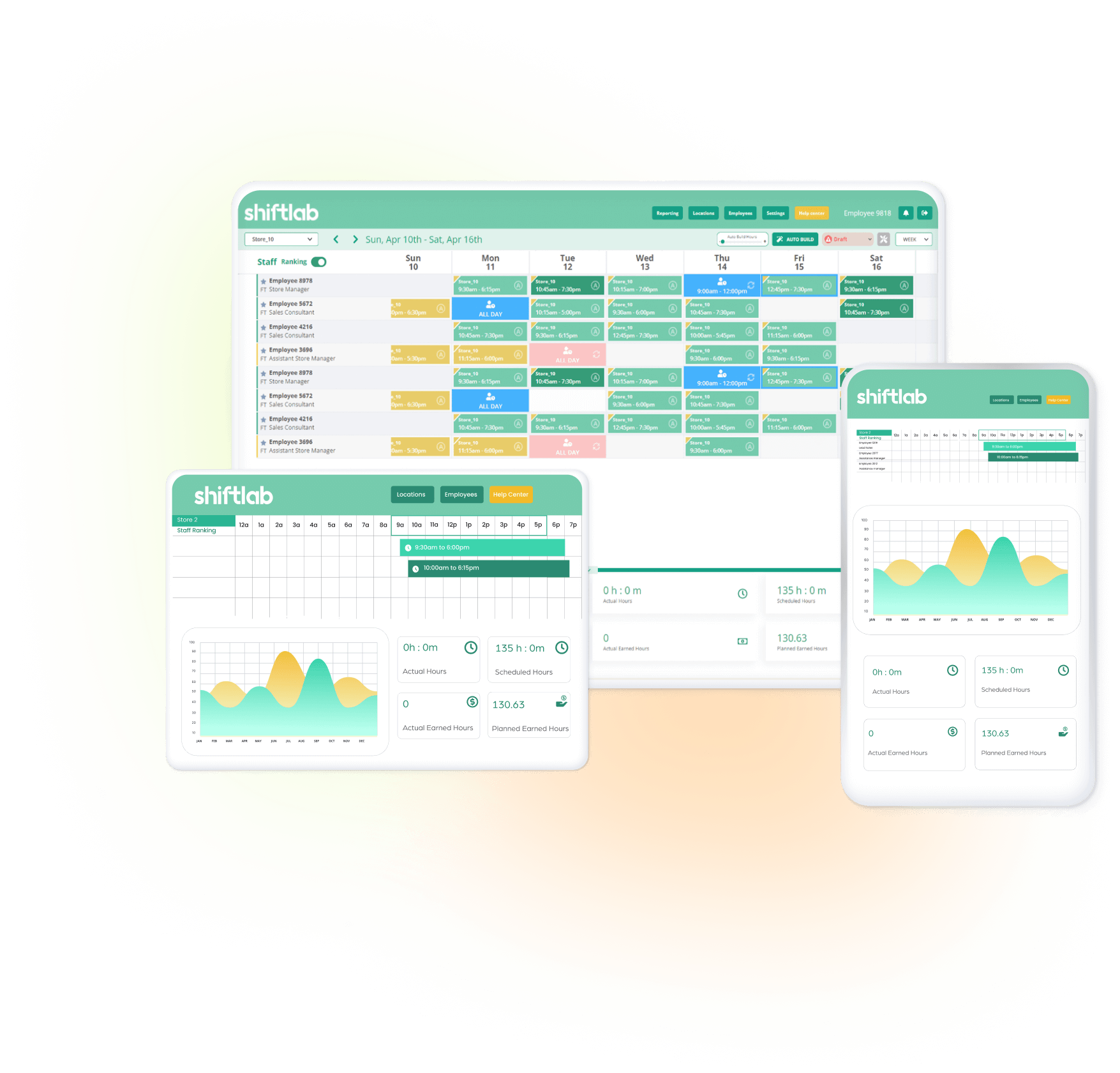
Retail Employee Time Management
Strategies and Best Practices for Employee Time Management

In the fast-paced world of retail, where every second counts and competition is fierce, managing time effectively is critical to success. Time management impacts every aspect of operations, from the efficiency of daily tasks to the overall satisfaction of customers. Effective time management goes beyond simply keeping a schedule; it's about optimizing operations, maximizing productivity, and ensuring that every moment spent contributes to the growth and success of the business.
Retailers who excel in time management are better equipped to meet customers' demands and create a working environment that promotes productivity. This leads to increased sales and reduced operational costs.
What is Employee Time Management?
Employee Time Management in retail is organizing, allocating, and optimizing your workforce's time to ensure that every minute contributes to the overarching goals of efficiency, customer satisfaction, and profitability. Retail time management goes beyond simply tracking hours; it's about balancing operational demands and staff well-being and creating an environment where productivity thrives.
Effective time management in retail has multiple objectives. Retailers can maximize their teams' efforts by prioritizing tasks, streamlining processes, and minimizing wasted time without compromising service quality. This balance helps to enhance the customer experience and boosts employee morale by reducing stress and burnout, leading to a happier workforce.
The Role of Time Management in Retail Operations
Efficient time management provides a foundation for increased productivity, profitability, and customer satisfaction. In a busy retail environment, where every interaction matters, the strategic allocation and optimization of time can elevate a store from surviving to thriving.
Productivity
At the heart of retail productivity is the ability to accomplish more in less time without sacrificing quality. Effective time management facilitates this by streamlining operations and eliminating inefficiencies, allowing employees to focus on tasks that directly contribute to the store's success. When employees are not bogged down by disorganization or unnecessary tasks, they can dedicate more energy and attention to serving customers, coaching new employees and improving the store environment.
Profitability
Profitability is also closely tied to how well a retailer manages time. By prioritizing tasks and optimizing schedules, retailers can reduce labor costs and minimize wasted resources. This strategic organization of tasks and time ensures that every minute and every dollar spent contributes directly to the bottom line. By regularly analyzing and adjusting employee schedules and time management strategies, retailers can identify employee time management issues, new opportunities for cost savings, and efficiency improvements, driving higher profitability.
Customer Experience
Customer satisfaction is significantly influenced by how effectively a store manages its time. Customers expect prompt service and instant gratification, and the ability to meet their needs and exceed their expectations quickly is invaluable. Efficient time management ensures that staff are available, shelves are stocked, and the shopping environment creates a positive experience. By reducing wait times and improving the overall efficiency of the store, retailers can significantly enhance customer satisfaction, build loyalty and encourage repeat business.

Time Management Strategies for Retailers
Creating Strategic Schedules
Creating strategic schedules in retail is much more than just filling shifts. It's about ensuring you have the right number of staff, with the right skills, at the right times to meet customer demand and optimize labor. Creating performance-based schedules where you have your top talent in the busiest shifts is a proven way to increase sales.
Strategic scheduling requires a deep understanding of customer traffic patterns, peak shopping hours, and employee performance. AI-powered employee Scheduling Software can help retailers create strategic schedules automatically.
By introducing strategic scheduling, retailers can significantly enhance their operational efficiency, provide better customer service, and drive sales and profitability.
Prioritization of Tasks and Effective Delegation
Understanding task priorities and effective task management is critical in retail. Every task does not carry equal weight, so it's important to identify which activities directly impact customer satisfaction and sales performance. This prioritization ensures that efforts are focused on high-value activities.
Tasks should be matched with employees' strengths and skills while also considering their workload and personal development goals. Effective delegation optimizes time and boosts employee morale and engagement by trusting them with responsibilities, contributing to their growth and the store's success.
Use of Time Management Tools and Technologies
Leveraging technology is non-negotiable for efficient time management. Tools such as employee scheduling software streamline the creation of work schedules, ensuring optimal staff levels at all times. Time-tracking apps promote accountability by providing insights into how time is spent, while retail performance apps give managers and employees real-time operational data needed to be effective throughout the day.
Setting Realistic Goals and Deadlines
Goals and deadlines are powerful motivators, but they must be achievable to be effective. Setting unrealistic targets can lead to frustration and burnout. When setting goals, it’s important to understand your team's capabilities and the limitations of your resources. Regularly reviewing and adjusting these goals based on performance and feedback ensures they remain relevant and attainable, driving the team towards continuous improvement.
Challenges in Employee Time Management
Managing multiple tasks and responsibilities is the reality for retail managers and employees alike. In a busy retail store, staff are often required to juggle a variety of tasks—from assisting customers and restocking shelves to processing payments and maintaining store cleanliness.
Balancing operational demands with customer service needs is another challenge. Providing exceptional customer service is at the core of retail success, yet ensuring that operational tasks like scheduling are also completed efficiently is crucial for maintaining the bottom line. This delicate balance requires employees to be flexible and managers to be strategic in task delegation and scheduling.
Overcoming these challenges requires a proactive approach, including strategic planning, clear communication, and the adoption of time management tools and technologies designed to streamline operations.
Best Practices and Tips for Retail Time Management
-
Regular Reviews
Top-performing retailers recognize the value of continuous feedback loops. They implement regular check-ins and employee performance reviews for all team members, focusing on both individual and team achievements. Retailers can adjust strategies and operations by identifying areas of employee time management improvement and celebrating successes. These evaluations often lead to actionable insights, enabling retailers to refine their processes and better align team efforts with organizational goals.
-
Investing in Employee Growth
Implementing continuous training programs elevates frontline employee skills and knowledge, directly impacting time management and productivity. Training programs can cover a range of topics, from customer service excellence and inventory management to effective communication and leadership. By providing ongoing learning opportunities, retailers empower employees to take on challenges more confidently. Commitment to development also boosts morale and loyalty, which are critical components of a thriving culture.
-
Encouraging a Culture of Efficiency and Accountability
Creating an organizational culture that values efficiency and accountability is key to optimizing time management. Successful retailers set clear expectations and provide employees with the tools and support needed to meet them. They foster an environment where everyone is encouraged to take ownership of their tasks and outcomes. This sense of accountability drives employees to manage their time more effectively, prioritize tasks strategically, and seek out ways to improve operations. Regular communication, team meetings, and open forums for sharing best practices are just a few ways that retailers reinforce this culture.
 Tools and Technologies for Employee Time Management
Tools and Technologies for Employee Time Management
Here's a look at some of the most effective solutions for managing employee time in retail:
Shift Scheduling Software
The right Employee Scheduling Software can transform the way retailers plan their workforce needs. Automating the scheduling process eliminates the time-consuming manual effort traditionally involved in creating schedules. The software considers various factors such as employee availability, traffic and demand, employee performance and labor rules to generate schedules that are optimized for sales and compliance.
This ensures that the right number of staff are on the floor at all times and significantly reduces scheduling conflicts. Advanced features may include performance-based scheduling, AI-powered demand forecasting and shift swapping.
Time Tracking Apps
Timekeeping apps enable retailers to accurately track work hours and offer insights into labor strategies. These apps can help identify areas where efficiency can be improved and ensure accurate payroll based on actual hours worked. Advanced features may include preventing early clock-ins, centralized timecard management and automated break compliance. By promoting a culture of accountability, these tools help retail managers decrease labor costs and focus on activities that drive sales and improve customer experiences.
Retail Performance Management App
Real-time data and effective communication are crucial to successful retail operations. Retail performance apps are designed to give managers and employees the real-time data needed to win their day. This includes notifications for core operational tasks like stores opening on time, break management and labor budget alerts. These apps enable teams to stay organized and make proactive decisions. Advanced features may include late store open notifications, upcoming or missed break notifications and overtime alerts.
Integrating these tools into daily retail operations optimizes time management and empowers employees to perform at their best.
Conclusion
Effective time management in retail is not just a necessity for operations; it's a strategic essential. It boosts productivity, reduces stress levels among staff, and directly impacts the bottom line. Implementing tools such as Employee Scheduling Software, Time Tracking Apps, and Retail Performance Management Apps empowers retail teams to excel in time management, increase productivity and enhance customer experiences.
Related Blogs


How Shift Swaps and Open Shifts Benefit Your Bottom Line
If you're a busy retail manager or owner overseeing multiple stores, you probably don't want to add...

The Hidden Costs of a Poor Employee Schedule—And How to Fix Them
Your employee schedule might not seem important to your store’s budget, unlike other major cost...
Flexible Retail Platform
Shiftlab seamlessly integrates your POS, Traffic, and Time Clock data into a single system.
Explore Integrations

Your complete retail performance platform
- Automated Scheduling
- Ai-Driven Forecasting
- Smart Timeclock
- Real-Time Performance Data
%201.png?width=564&height=119&name=Shiftlab_Logo%20(Black)%201.png)